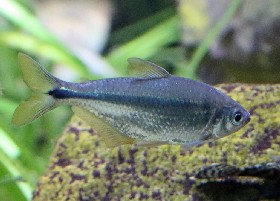Mexican Blind Cave Fish Astyanax mexicanus



There are many species of blind or partially blind cave-dwelling fish in many countries. These have adapted to a dark,
cave environment where sight is of little or no importance and other senses compensate. The Mexican Blind Cave Fish has a totally normal
surface-dwelling (stream/river) variant of exactly the same species - the Mexican Tetra. The latter has eyes, sight and pigment.



The Mexican Blind Cave Fish and Mexican Tetra are native to Texas, especially the Rio Grande, and to eastern Mexico. The former
lives in underground caves and is born with eyes but, because it does not need them, flaps of skin grow over them for protection. The body is a pinkish white
with no pigment but it has a lateral line that is sensitive to changes in water movement and pressure. (The sighted, surface stream-dwelling relative
also shows a lateral line on silver-grey.) They grow to 12cm long.



Like other Tetra, they are schooling species. Some recognise the blind, cave-dwelling form as a separate species from the
sighted, pigmented Mexican Tetra, giving it the name A. jordani.



Although it is occasionally called the Blind Tetra, that name is more commonly given to the Brazilian Blind Tetra,
Stygichthys typhlops, native to caves in northern Brazil.



